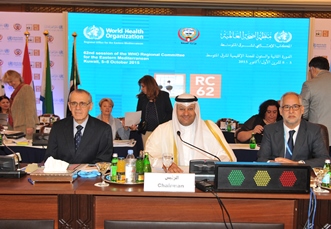 Dr Ala Alwan, WHO Regional Director for the Eastern Mediterranean, HE Dr Ali Al Obaidi, Minister of Health of Kuwait, Dr Jaouad Mahjour, WHO Director, Programme Management, at the closing session of WHO’s 62nd session of the Regional Committee for the Eastern MediterraneanKuwait, 8 October 2015 – The World Health Organization Regional Committee for the Eastern Mediterranean concluded its 62nd session on 8 October with the adoption of important resolutions and decisions to advance the health agenda in the Region. The resolutions outline joint work expected from Member States and WHO in the areas of health security, prevention and control of emerging infections, prevention of cardiovascular diseases, diabetes, and cancer, medical education, mental health, and assessment and monitoring of the implementation of the International Health Regulations (IHR 2005), among others.
Dr Ala Alwan, WHO Regional Director for the Eastern Mediterranean, HE Dr Ali Al Obaidi, Minister of Health of Kuwait, Dr Jaouad Mahjour, WHO Director, Programme Management, at the closing session of WHO’s 62nd session of the Regional Committee for the Eastern MediterraneanKuwait, 8 October 2015 – The World Health Organization Regional Committee for the Eastern Mediterranean concluded its 62nd session on 8 October with the adoption of important resolutions and decisions to advance the health agenda in the Region. The resolutions outline joint work expected from Member States and WHO in the areas of health security, prevention and control of emerging infections, prevention of cardiovascular diseases, diabetes, and cancer, medical education, mental health, and assessment and monitoring of the implementation of the International Health Regulations (IHR 2005), among others.
Acknowledging progress made and ongoing challenges and gaps in relation to regional strategic priorities, the Regional Committee adopted the Annual Report of the Regional Director Dr Ala Alwan on the work of WHO in the Eastern Mediterranean during 2014.
Member States agreed on the establishment of a regional mecanism to assess implementation of the International Health Regulations (IHR) and to advise Member States on reinforcement of their national core capacities. This resolution is of major importance as under the obligations of the IHR, countries are collectively accountable for protecting their own populations, as well as global health security.
Noncommunicable diseases, the world’s biggest killers and a leading cause of death in the Region, were high on this year’s agenda. People are dying too young from heart disease, cancers and diabetes. Participants endorsed a resolution that welcomed the efforts of the Regional Director to raise global and regional awareness of the magnitude of the problem and to strengthen action in the prevention and control of these diseases. The resolution urged Member States to take the necessary actions to reduce premature mortality from Noncommunicable diseases.
For the first time ever, the Regional Committee endorsed a framework for action on strengthening medical education. Health professions education is an important area in promoting public health, strengthening health systems and advancing country progress towards universal health coverage.
The mental health treatment gap in some countries of the Region is as high as 90% in some countries despite the availability of cost-effective and evidence-based interventions. The fact that a large number of countries in the Region are facing complex emergencies is contributing to increasing rates of mental disorders. To address this, Member States agreed to scale up mental health care and implement four strategic interventions related to governance, prevention, health care and surveillance.
Related link
62nd session of the Regional Committee for the Eastern Mediterranean


